Growing up in Eastern Australia, between Canberra and Sydney, David Howarth had one very simple passion, rugby. Passion might even be underselling it.
“Growing up, my old man was a rugby player.
“I had an absolute obsession with rugby and rugby league.
“When I was really young, I’d sit on my dad’s lap and watch rugby league on a Saturday afternoon. We used to watch every bit of footy we could,” he said.
He didn’t just stop at rugby. Surfing, golfing, basketball, and boxing were all on the menu at various stages of his life. But rugby was certainly the main focus and a career as a professional rugby player was the dream for a young David. His father made sure that his ambitions didn’t get too lofty.
“When I left school, I headstrongly said to my dad that I wanted to be a professional rugby player.
“He laughed and shook his head and said that I’d need a trade if I was going to go down that path. When I finished school, he lined me up with a mate of his who was a superintendent on a golf course.
“I spent the next five or six years training and playing rugby. I played as well as I could, but the reality was, I wasn’t good enough,” he said.
Around 2002, David got the opportunity to travel halfway across the world and do an internship in the US. While living and playing rugby in Florida, he had a friend who was studying in Miami.
“Somehow, I got invited in to watch a few gym sessions and train. The environment they were training in, the gym itself, and the level of intensity and focus they had was insane. The players were trying to make a push for the NFL. I’d never been part of a team like it before. I loved it. I was there for 6 months,” he said.
David returned to Australia with a new passion, coaching.
“When I came home to Canberra, I realised this is what I wanted to do. I pushed really hard. It was around 2005 or 2006 and I just got it into my head that I wanted to coach.
“Mowing fairways and greens weren’t for me anymore.
“I did a personal training course. I said to my club at the time that I’d love to explore coaching. After pre-season, they said that coaching wasn’t for me. I wanted to play too much.
“They suggested I look at S&C. I moved back to Sydney and did a degree in applied science and sports exercise. I got an honour in three years. I worked with rugby academies. I worked with MMA fighters. I worked with surfers. I worked wherever I could. It took me a while, but I realised being an S&C coach, and more recently being a sports scientist, is what I’m passionate about,” he said.
However, David would quickly realise that having relevant qualifications doesn’t automatically guarantee you a job. At least not one that could have sustained him and his then-pregnant wife. Instead, he got a job with a medical device company. That only lasted six months as David says it wasn’t the right fit and certainly wasn’t his passion for coaching.
He would get the chance to return to the United States soon after as his wife was offered a job in South Carolina. It was an opportunity that David wanted to grab with both hands.
“We were there for about eight months. During that time, I was connecting with as many people as I possibly could. I reckon I put in about 150 job applications. Every university S&C, graduate assistant, internships.
“I’d spend time with people in the industry, talking shop and being in the weight room. It wasn’t feeding my family, but it was feeding my drive. Eventually, I reached out to a friend of a friend who put me in touch with Phil Wagner at Sparta Science.
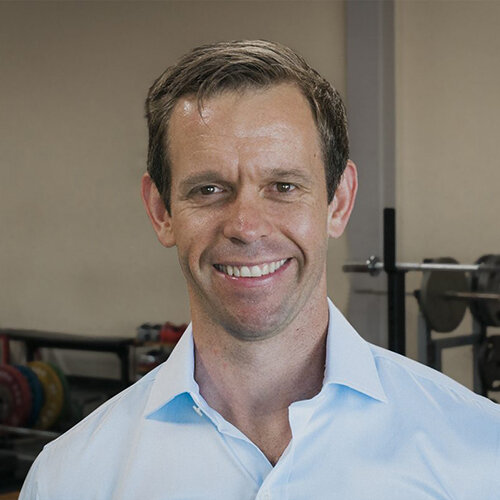
Phil Wagner, Founder of Sparta Science. Credit: Sparta Science.
“They happened to be doing some hiring. I met with them in person, and they offered me a role there. That was the first really big role for me. Up until then it was bit parts and working two or three roles and really working at it. I’ll forever be grateful to Phil and Sparta for that. Not just for the job but for the teaching and learning. They showed me a whole new world,” he said.
It was a role that would set David on the path he had been longing to go down for so long. He would work with personnel from the NBA, NFL, and MLB. And soon enough, about 18 months into his tenure with Sparta, a role came up with the former of those three.
The Oklahoma City Thunder were looking for a new S&C coach, and it was a tough act to follow.
“My predecessor there was a man named Dwight Daub, who had been the Head Strength & Conditioning Coach for that organisation, including the Seattle Supersonics, in total, for 18 years. He decided to retire. He was coming to an age where he didn’t want to do the travel anymore. He was a brilliant coach.
“Because he decided to retire, OKC was looking to replace him. They were looking for someone to come in and learn from him and work with him for a year and then, after that, take on the role themselves.
“They had been going through that search process for about two years. Dwight had given them loads of notice. Wanted them to know that he was going to retire at a certain age and that it was coming. They wanted to give as much time to the incoming person too.
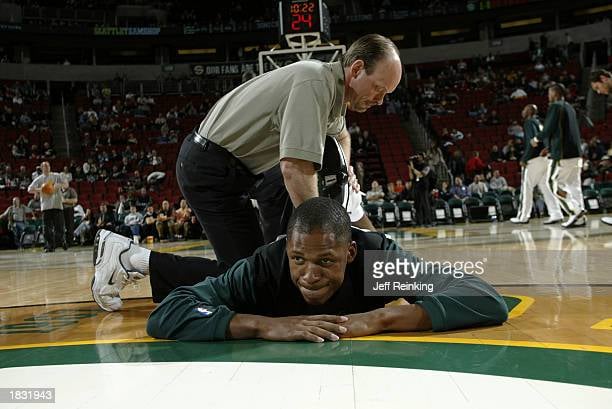
Dwight Daub stretching out Ray Allen before a Seattle Supersonics game. Credit: Getty
“Eighteen years, there’s a lot of history there that you are trying to work with and understand and evolve from. Not just say that Dwight did it this way, but this is my way. You couldn’t do that. At least not in the Thunder’s mind.
“It’s incredible from a management standpoint, to have that sort of foresight, that forward-thinking approach to hiring, and keeping continuity in roles. But it’s what the Oklahoma City Thunder do, it’s what Sam Presti (General Manager of the Thunder) does. He’s brilliant like that. He’s always thinking three or four years ahead,” he said.
Possibly a testament to the work he had been doing with Sparta in California, and the connections he had made during his time in the US, David was approached on LinkedIn by the recruitment firm tasked with finding Daub’s replacement and asked if he had any interest in the role.
“I was really wary at first. I was wondering how it would work. They hadn’t told me who the team was yet. But they told me about all these scenarios. I was interested in hearing more and we had some initial interviews.
“The team were in the NBA finals at the time. I had no idea who Kevin Durant, Russell Westbrook, or Serge Ibaka were. They could have been anyone. They were just really tall guys as far as I was concerned. Obviously, they had a lot of skills because they were playing in the NBA, but I didn’t know who they were. I hadn’t thought about the NBA since Michael Jordan retired when I was 14 years old,” he said.
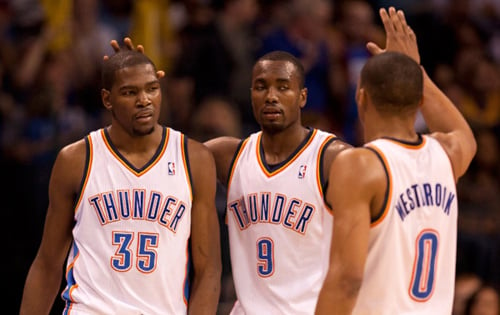
Kevin Durant, Serge Ibaka, and Russell Westbrook in action for OKC. Credit: The Franchise
After those initial talks, David was flown out to Oklahoma to have further meetings and meet with team personnel. It was these meetings that made up his mind about the job.
“I heard them out and listened to them and we had some really good discussions.
“I chatted to Dwight and heard about what he was doing. I remember thinking immediately that this guy was something special.
“I was absolutely petrified going out there. I went through two days’ worth of interviews and after the first day, I called my wife and told her that they didn’t want me. I felt I was wrong for them. I was a bit traditional in my S&C approach. I like seeing guys shift weight, music up, the room pumping. That’s the environment I liked. This job seemed like personal training.
“Anyway, the first day ends and we go for dinner. We had an amazing discussion about performance and organisations. I started realising that this was about way more than just sets and reps. This is something you can really grow and learn from. You can learn about the business of sport. You can learn about the business of the NBA. Kevin and Russ, what they mean to that organisation. Not just the Thunder, but the NBA. I was enthralled by it.
“I got up the next morning, got in early. I’d organised to meet Dwight. He was already there warming up. So, I had a lift with him. We had a great chat as we were going through it. About life, about family, his kids, my daughter, our wives, moves and changes that we’d had.
“After that discussion, I was convinced I had to work with this guy. I wanted to learn from him. Whatever fear I’d had going into the first day, I shed it. I went hell for leather and gave it everything I had. The second day went very well. We covered exercise stuff. The nitty-gritty of it all. My previous experience training athletes, where I had been before. Then, that was it. Great couple of days. They said they’d be in touch,” he said.
It was a ten-day wait for David before he’d find out his fate. Convinced he had been unsuccessful, he eventually got the call from Donnie Strack, VP of Health & Performance, to confirm he had been chosen.
What had started as a passion and obsession with becoming a rugby player in Australia had now turned into an S&C job in the NBA, working with two of the league’s biggest stars in Russell Westbrook and Kevin Durant as he followed his passion through every turn in his life.
It would be three seasons that David would spend with the Thunder, each coming with its own challenges, their own highs, and their own lows.
“The 2014-15 season hurt. It was my first year.
“Kevin Durant broke a bone in his foot. He had to have a massive screw put through the bone to fix it. It never came good. He played less than 40 games that year. Effectively, in the end, we shut him down.
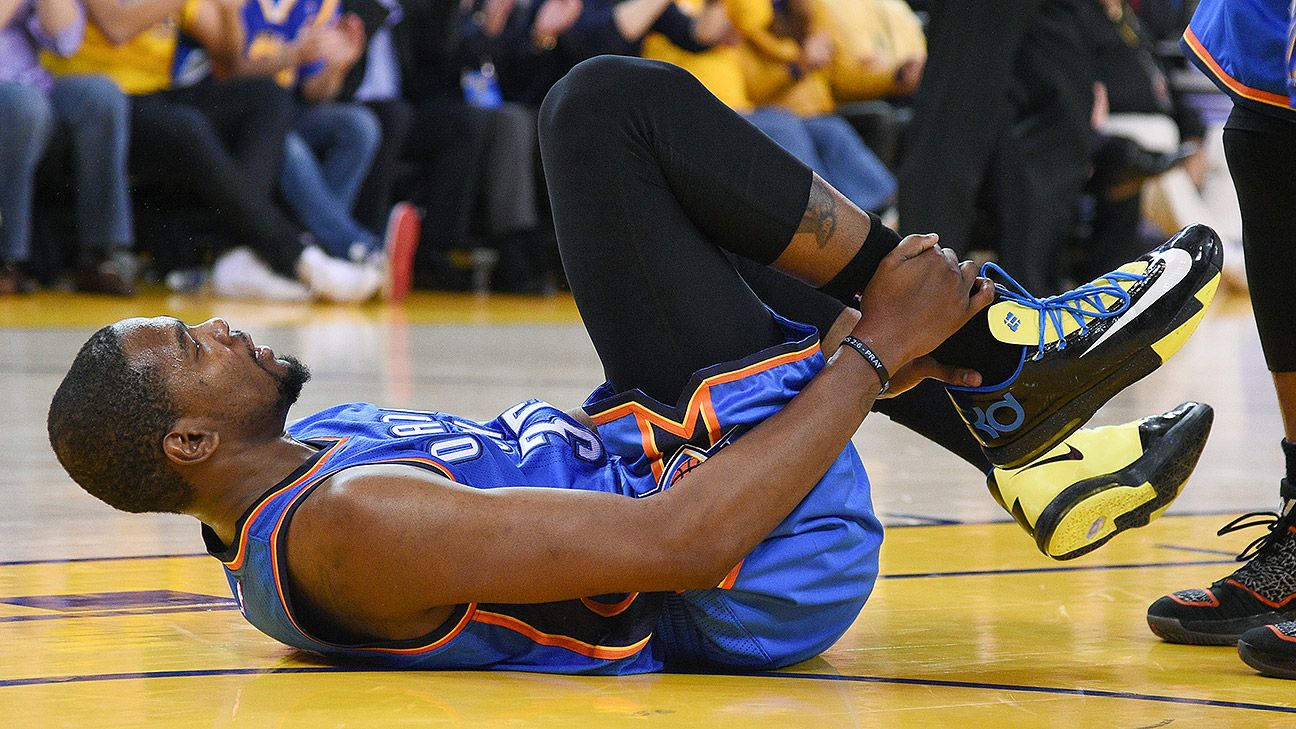
Kevin Durant after suffering a broken bone in his foot. Credit: ESPN.
“We didn’t make the playoffs for the first time in about five years. At the end of that year, Scott Brooks (Head Coach at the time) got let go,” he said.
The offseason following the 2015 playoffs would be just as busy for David as the regular season. He split his time amongst many locations as the players went about their own personal summer schedules. Westbrook and Durant would set up in Los Angeles. Serge Ibaka was in New York. And Steven Adams went all the way back to his home in New Zealand.
In the 2015-16 season, the Thunder would hit the ground running.
“We had Russ on song, starting to play incredible ball. Kevin was back to his old self, making buckets from everywhere.
“Billy Donovan came in and did a great job, but he also had great staff around him. I think that’s what the best head coaches do, they put great staff around themselves. Monty Williams was one of the assistant coaches that year.
“Monty was the guy to reach Kevin Durant. I needed Kevin to keep on lifting. I really needed him to love becoming strong and he didn’t have that at that stage. He knew he had to do it. He didn’t know it could be transformational for him. Monty convinced him it would be. We created a schedule that worked for him, and Monty was in there with him for nearly every gym session, going through all the same work. When you’ve got that kind of advocate as a coach, it’s brilliant,” he said.
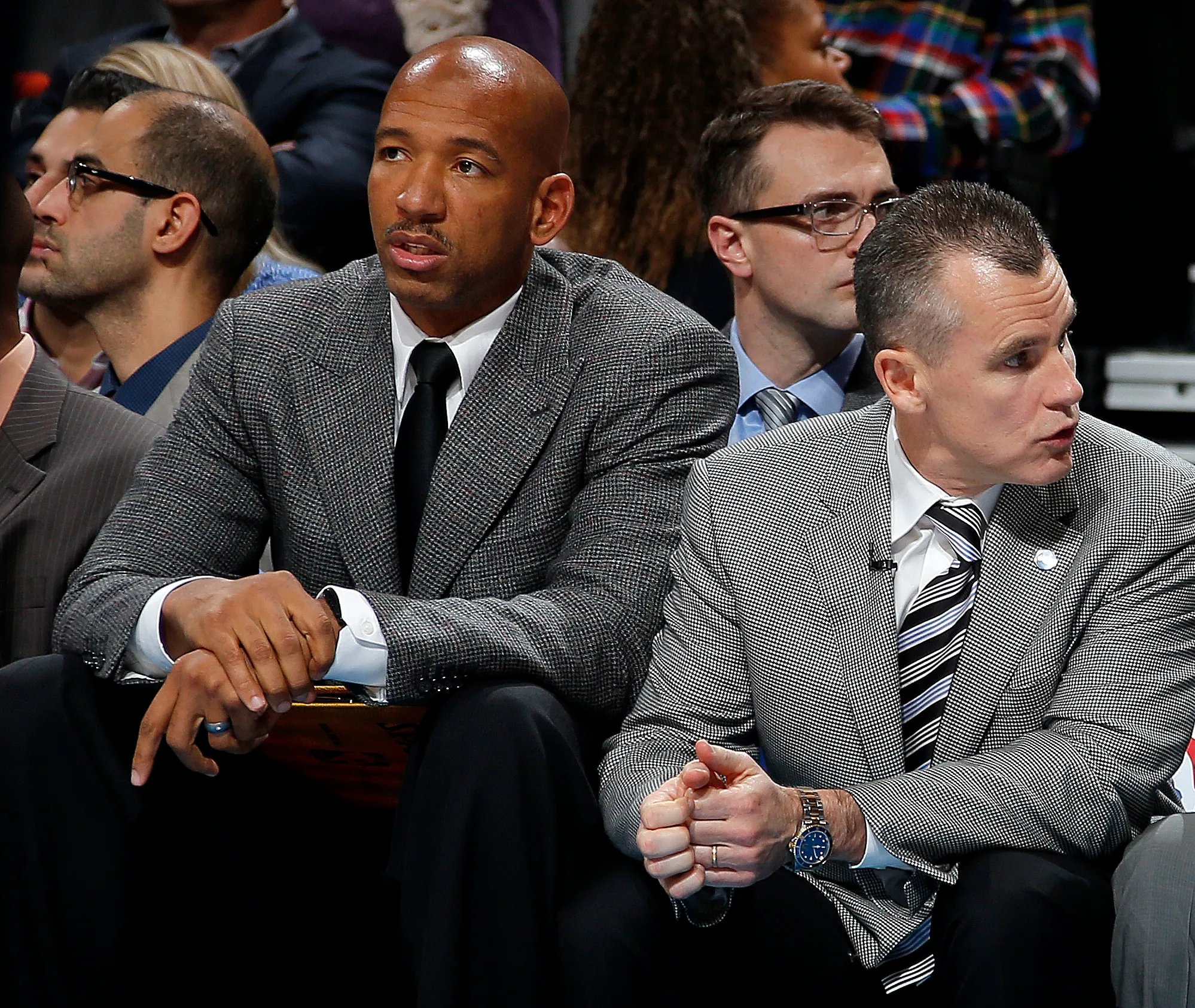
Monty Williams and Billy Donovan on the bench for OKC. Credit: The Oklahoman.
The Thunder would storm out to a commanding record and looked set to be one of the favourites for the playoffs that year. Then tragedy struck halfway through the season.
“One of the pieces of context around that season that was really hard, that was the season that Monty Williams’ wife passed away. She died in a car accident. That floored us. Every single one of us was so close to that family. My wife was. She was absolutely broken when she heard that news, we all were.
“Sometimes those types of events can galvanise a group. I saw a shift in that team from a good team who was performing well, to a very good team who was doing it for something bigger than themselves. They really ramped up and we came home in the second half of that season really strong. We were incredible,” he said.
They would start the playoffs strong that year. They easily dispatched the Dallas Mavericks. What followed was an iconic series against the San Antonio Spurs, NBA champions just two years previous.
“Six-gamer against the Spurs that nobody thought we were going to make it out of. We got floored in game one.
“But then you watch game two. Dion Waiters at the end of that game did whatever he could to make us win. Dion was a competitor. He wanted to find a way to win, and he did.
“André Roberson’s defence, Steven Adams defending down the lane like nobody’s business. It was incredible. We did all the things we had done all season. Kevin lifting weights on game day, Steven doing power work right before the game, and Enes Kanter focusing on feeling strong in his upper body and loose and bouncy through his hips and ankles. All the stuff was there.
“It’s what I always talk about as an S&C. Be really consistent with these things. We were able to compete at the highest level all the way through,” he said.
Awaiting them in the Western Conference Finals was a meeting with the reigning champions, Steph Curry, and the Golden State Warriors. It would be a series of extreme highs and even more extreme lows.
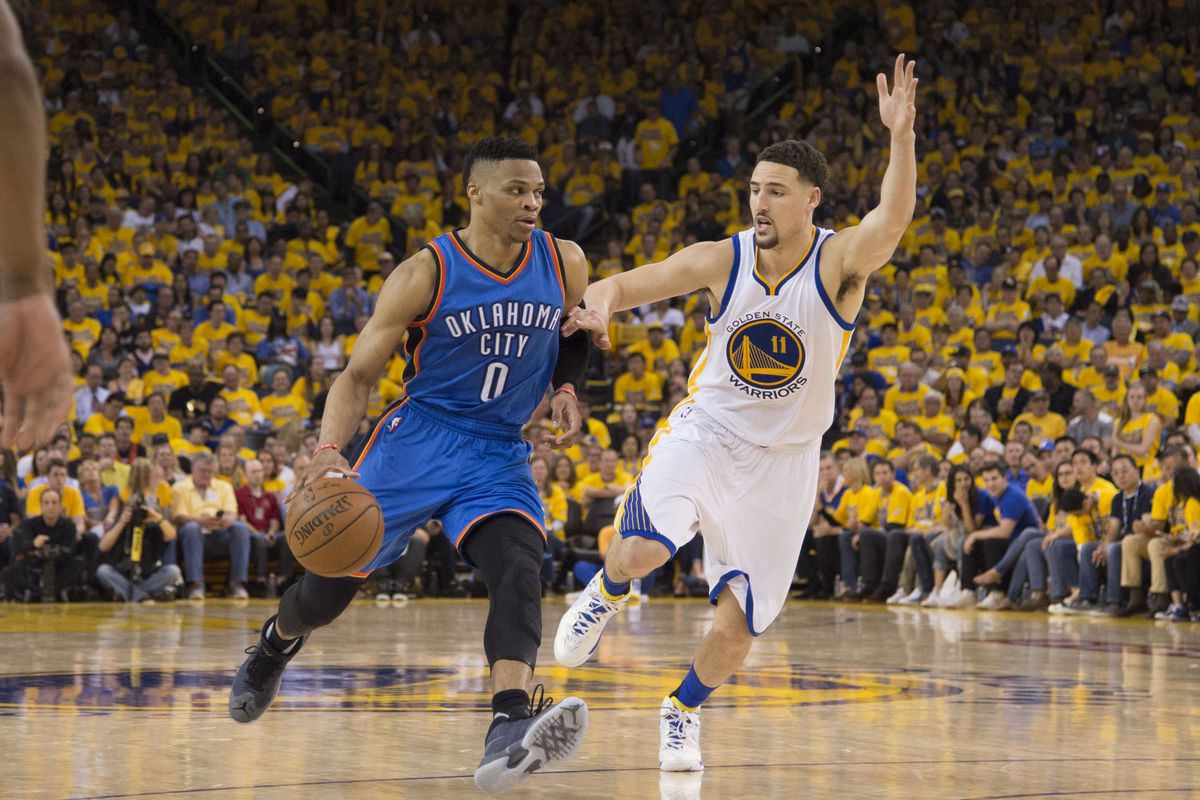
Russell Westbrook battles with Klay Thompson in the 2016 Western Conference Finals. Credit: Golden State of Mind.
“We get into that series with Golden State. We lose the first one, as we were expected to. Then we steal the second one. And we get the two at home and suddenly we’re up 3-1.
“Now the pressure was on. We had to put one more game away and then we had Cleveland, who we knew we could beat. Everything they did went through LeBron, it was one-dimensional. We had too much for them. The threat was Golden State.
“Golden State got better. Steph and Klay were unbelievable. Draymond Green was a force when he wasn’t kicking Steven Adams in the groin. And every single mistake that we made throughout the year started to come out. We started playing for glory rather than something bigger than ourselves. It slipped away from us.
“If you go back and watch the series and watch game six, which we were in control of, we let that go. Steph and Klay were making everything they took. And we couldn’t recover from that.
“I still remember standing on the court before game seven, stretching out Kevin and Steven. I remember the magnitude of that event and being in total awe. In awe of the place, the people, and my role in it. To this day I stay in touch with the guys. I spoke to Steven a couple of weeks ago. I talk with Russ every now and then. I talked to Kevin when he changed from Golden State to Brooklyn. They are fantastic people,” he said.
It was a long journey for David from where he had come from to that point. From humble beginnings, wanting to play rugby professionally, he had ascended to a stage that very few ever get to experience in the NBA Western Conference Finals. He had followed his passion and it had rewarded him many times over.
However, the intensity of the role took its toll.
“In my second year, I had been away from the house for 270 days out of 365. I hadn’t spent much time with my kids or my wife.
“Going into that third year I knew I was coming up on a bit of burnout. I wasn’t doing a good job. I was getting really nervous about what I was contributing. I worked as much as I could with guys that were coming in,” he said.
It was a Thunder team that was moving on to a different phase. Kevin Durant moved on to the Golden State Warriors, the team that had just knocked the Thunder out, in a move that is still hotly debated in basketball circles to this day.
David spent one more season with the Thunder in which he got to witness history when Russell Westbrook became the first player since the 1960s to average a triple-double over the course of an entire season and become the league’s Most Valuable Player.
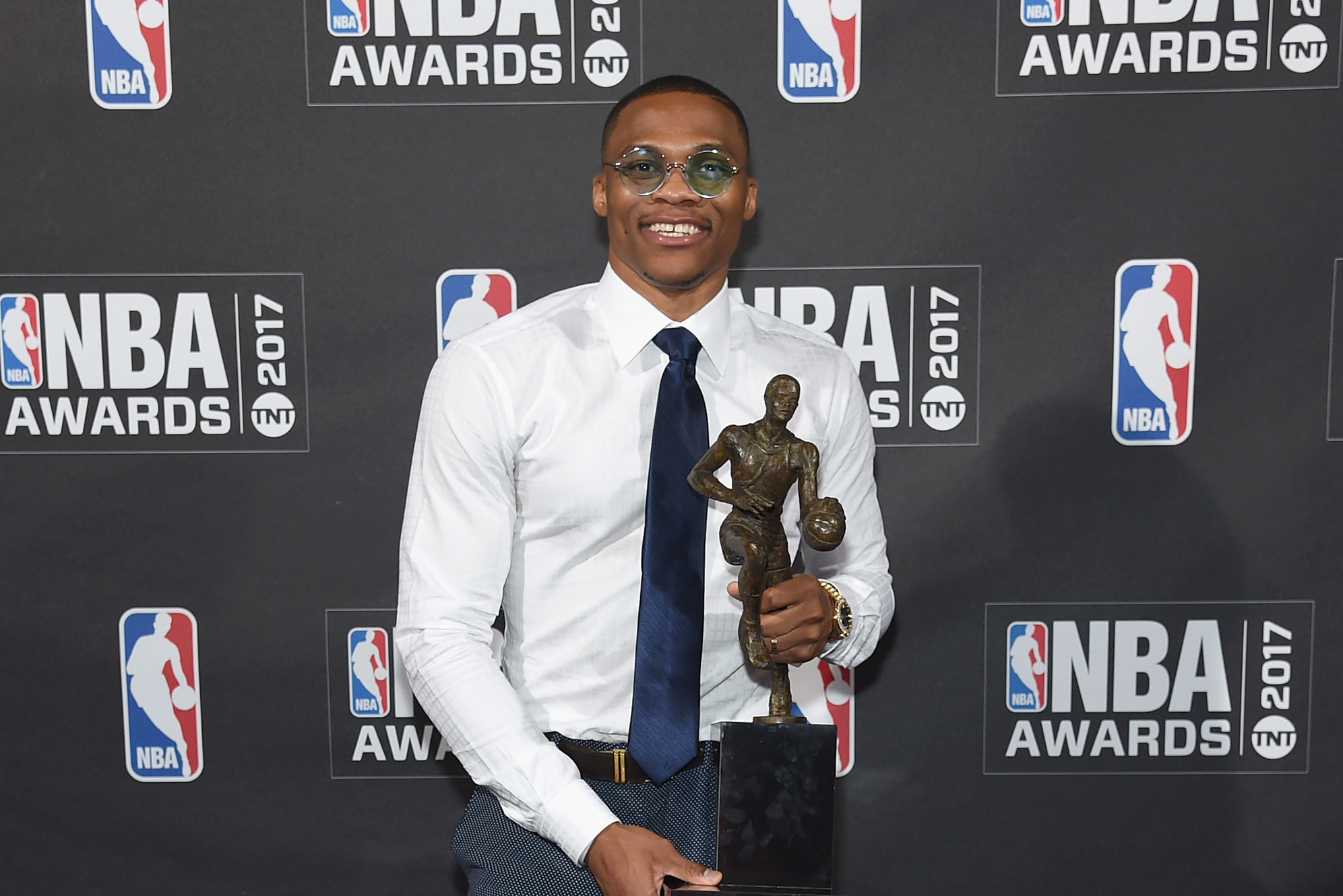
Russell Westbrook with his 2017 MVP trophy. Credit: Bleacher Report.
Despite the individual success of Westbrook, the team suffered from the loss of Durant. They just about made the playoffs and lost emphatically in the first round to the Houston Rockets.
“We weren’t the same team. I think that season was very similar to me at the time. Not that my mood dictated the season. Or that the season dictated my mood. It was just that I knew if I wanted to do this well, I had to either address my imposter syndrome, refresh, reconnect with family, or learn more.
“I just started a research master's that year, which was incredible. That line of research became my PhD also. It was an incredible three years with OKC. The stuff I learned from the people there but also how it changed my view on things,” he said.
Advancing his education was a catalyst that supported him to follow his passion to new places with new opportunities.
David left the NBA in 2017 and found a new venture. It took him to the west coast of Ireland and back to his rugby-loving roots. He accepted a role as the Head of Athletic Development for Connacht Rugby where he worked with Nick Winkelman and the IRFU.
He spent five years with Connacht, working closely with star players like Bundee Aki, someone who he likens to Russell Westbrook. It was a role that David says allowed him the growth he felt he needed at the end of his Thunder tenure.
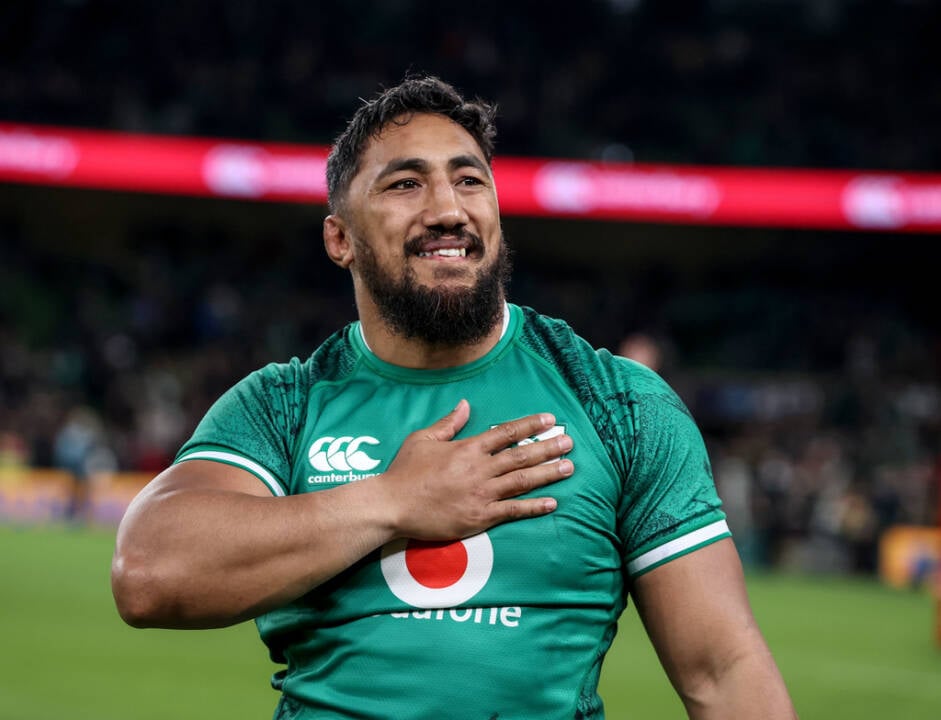
Ireland and Connacht's Bundee Aki. Credit: Irish Rugby.
He is now taking a career break as he finishes his PhD in Sport and Exercise. He is excited about the future but says he is unlikely to ever return to the NBA.
Working in sport, particularly at the level that David Howarth does is a career driven by passion. If you are interested in following your passion for a career in sport, Portobello Institute offers quality degrees and masters programmes delivered by LJMU, University of Essex and London Metropolitan University. You can see all our upcoming courses here.
Get in Contact
Our expert sports admissions advisor, Jo Shaw, understands that people who want to follow their passion for a career in sports from physiotherapy to PE or sports science, want the best pathway for their career success.
If you are interested in any of our sports courses or have any questions you can book a consultation call with Jo here, email jo.shaw@portobelloinstitute.com or call 01 892 0024.




.png?width=352&name=Feature%20image%20(38).png)
-1.png?width=352&name=Colms%20Sports%20Article%20Feature%20Images%20(8)-1.png)